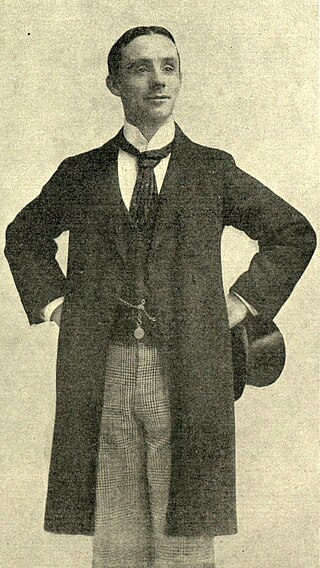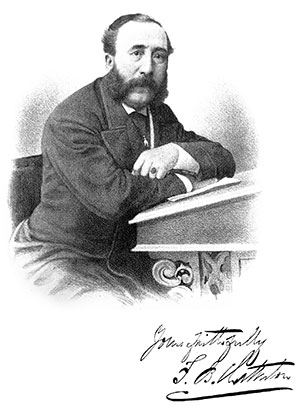
Harlequinade is an English comic theatrical genre, defined by the Oxford English Dictionary as "that part of a pantomime in which the harlequin and clown play the principal parts". It developed in England between the 17th and mid-19th centuries. It was originally a slapstick adaptation or variant of the commedia dell'arte, which originated in Italy and reached its apogee there in the 16th and 17th centuries. The story of the Harlequinade revolves around a comic incident in the lives of its five main characters: Harlequin, who loves Columbine; Columbine's greedy and foolish father Pantaloon, who tries to separate the lovers in league with the mischievous Clown; and the servant, Pierrot, usually involving chaotic chase scenes with a bumbling policeman.

George Wild Galvin, better known by the stage name Dan Leno, was a leading English music hall comedian and musical theatre actor during the late Victorian era. He was best known, aside from his music hall act, for his dame roles in the annual pantomimes that were popular at London's Theatre Royal, Drury Lane, from 1888 to 1904.
Drury Lane Theatre may refer to:

Joseph Grimaldi was an English actor, comedian and dancer, who became the most popular English entertainer of the Regency era. In the early 19th century, he expanded the role of Clown in the harlequinade that formed part of British pantomimes, notably at the Theatre Royal, Drury Lane and the Sadler's Wells and Covent Garden theatres. He became so dominant on the London comic stage that the harlequinade role of Clown became known as "Joey", and both the nickname and Grimaldi's whiteface make-up design were, and still are, used by other types of clowns. Grimaldi originated catchphrases such as "Here we are again!", which continue to feature in modern pantomimes.

Widow Twankey is a female character in the pantomime Aladdin. She is a pantomime dame, played by an older man.

The Theatre Royal, Drury Lane, commonly known as Drury Lane, is a West End theatre and Grade I listed building in Covent Garden, London, England. The building faces Catherine Street and backs onto Drury Lane. The present building, opened in 1812, is the most recent of four theatres that stood at the location since 1663, making it the oldest theatre site in London still in use. According to the author Peter Thomson, for its first two centuries, Drury Lane could "reasonably have claimed to be London's leading theatre". For most of that time, it was one of a handful of patent theatres, granted monopoly rights to the production of "legitimate" drama in London.

A pantomime dame is a traditional role in British pantomime. It is part of the theatrical tradition of travesti portrayal of female characters by male actors in drag. Dame characters are often played either in an extremely camp style, or else by men acting butch in women's clothing. They usually wear heavy make up and big hair, have exaggerated physical features, and perform in an over-the-top style.

Pantomime is a type of musical comedy stage production designed for family entertainment. It was developed in England and is performed throughout the United Kingdom, Ireland and in other English-speaking countries, especially during the Christmas and New Year season. Modern pantomime includes songs, gags, slapstick comedy and dancing. It generally combines gender-crossing actors and topical humour with a story more or less based on a well-known fairy tale, fable or folk tale. Pantomime is a participatory form of theatre, in which the audience is encouraged and expected to sing along with certain parts of the music and shout out phrases to the performers.
George Spence Melvin was a Scottish music hall comedian and noted pantomime dame.

Frederick John D'Auban was an English dancer, choreographer and actor of the Victorian and Edwardian eras. Famous during his lifetime as the ballet-master at the Theatre Royal, Drury Lane, he is best remembered as the choreographer of many of the Gilbert and Sullivan operas.

Drury Lane pantomime is a long tradition at the Theatre Royal, Drury Lane, dating from the early 18th century. In every Christmas season, a pantomime is produced which has a leading place among the many other pantomimes of the capital. Other pantomimes are sometimes produced during the rest of the year. Pantomime Theatre is a family-friendly genre of stage performance that includes cross dressing actors performing songs, dances, skits, and slapstick comedy.

Herbert Campbell, born Herbert Edward Story, was an English comedian and actor who appeared in music hall, Victorian burlesques and musical comedies during the Victorian era. He was famous for starring, for many years, in the Theatre Royal, Drury Lane's annual Christmas pantomimes, predominantly as a dame.
Abanazar is a magician and the primary antagonist in the Aladdin pantomime. He was also the basis for Jafar in the Disney version of Aladdin.

Ada Blanche was an English actress and singer known early in her career for vivacious performances in Victorian burlesque and pantomime and later in character roles in Edwardian musical comedy.

Victoria Rosaline Sarah Vokes was a British music hall, pantomime and burlesque actress and dancer of the 19th-century and a member of the Vokes Family of entertainers. For more than ten years they were the central attraction at the annual pantomime at the Theatre Royal, Drury Lane from 1868 to 1879 when their popularity began to wane.

Jessie Vokes was a British music hall, pantomime and burlesque actress and dancer of the 19th-century and a member of the Vokes Family of entertainers. For more than ten years they were the central attraction at the annual pantomime at the Theatre Royal, Drury Lane from 1868 to 1879 when their popularity began to wane.

Fawdon Vokes was a British music hall, pantomime and burlesque actor and dancer who performed as a member of the Vokes Family of entertainers popular in the 1870s in Great Britain and the USA. For more than ten years they were the central attraction at the annual pantomime at the Theatre Royal, Drury Lane from 1868 to 1879 when their popularity began to wane.

Frederick Balsir Chatterton, known as F. B. Chatterton was a 19th-century British theatre manager and impresario who was lessee of the Theatre Royal in London's Drury Lane from 1866 to 1879. He is credited with originating the famous quote, "Shakespeare spelt ruin and Byron bankruptcy".

Shaun Glenville was an Irish actor who specialised in pantomime performances; he would play the dame while his wife Dorothy Ward would play the principal boy. The music hall historian Christopher Pulling called him one of the 'grand comedians of the music-halls'. He had a successful 62-year career and played in over 40 pantomimes.

Arabella Menage, also known as Mrs. Sharp, was a British actress and ballet dancer. She was the wife of the artist Michael William Sharp.














